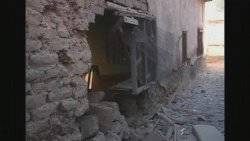Turkish armed forces have launched artillery attacks against Syria in response to a mortar attack which killed five members of the same family in southeastern Turkey.
In a statement on Wednesday, Recep Tayyip Erdogan, Turkey's prime minister, said the attacks, carried out following radar tracking, were within the rules of engagement.
Separately, Bulent Arinc, deputy prime minister, said: "There has been an attack on Turkey's mainland and its citizens lost their lives. There is definitely a response to it in international law ... We are not blinded by rage but we will protect our rights to the end in the face of such an attack on our soil that killed our people."
Al Jazeera's Andrew Simmons, reporting from Antakya on the Turkish-Syrian border, said Arinc's mention of "certain responsibilities" contained within NATO treaty articles, could mean that Turkey responded without consulting international bodies first.
Turkey has also asked the United Nations Security Council to take "necessary action" to stop Syrian aggression, calling the mortar attack "a flagrant violation of international law."
The Syrian Observatory for Human Rights said: "several shells from the Turkish side of the border fell on Syrian military positions near the village of Tal al-Abyad".
Western officials, from Anders Fogh Rasmussen, NATO secretary-general, to Hillary Clinton US secretary of state, quickly condemned the initial attack from the Syrian side of the border, which struck a house in the border town of Akcakale.
Omran Zoabi, Syrian information minister, said Damascus was looking into the origin of the deadly cross-border shelling.
In a statement reported by state television, Zoabi said: "Syria offers its sincere condolences to the families of the victims and to our friends the Turkish people".
US 'outraged '
Clinton said the White House was "outraged" by the "very dangerous situation" created by the attack.
Turkey agreed to convene an urgent meeting of NATO members in Brussels to discuss the shelling.
The meeting of NATO ambassadors fell under Article 4 of the NATO charter which provides for consultations when a member state feels its territorial integrity, political independence or security is under threat.
At the meeting, Turkey was expected to argue it was "fully entitled to respond" in the manner in which it did, Al Jazeera's Simmons said.
Witnesses said policemen were also injured in the Akcakale shelling, which originated only kilometers away from the Syrian border.
Ahmet Davutoglu, Turkey's foreign minister, briefed Ban Ki-Moon, UN chief, on the situation shortly word of the attack reached Ankara.
Though this the mortar attack marks the third instance of Syrian gunfire or artillery reaching Turkish territory, it is the "first time Turkey has actively become involved" in the situation, our correspondent said.
Calling it a "very serious escalation", he said the last time there was such tension between the neighboring countries was when a Turkish war plane was downed in June.
However, Turkey did not retaliate in that instance.
Aleppo explosions
Earlier on Wednesday, four blasts struck a government-controlled district close to a military officers' club in the northern Syrian city of Aleppo, killing dozens and wounding more than 100, opposition activists said.
"A medical source said that at least 40 people were killed and 90 injured," the UK-based watchdog group Syrian Observatory for Human Rights (SOHR) said.
"Most of them were regime troops."
Meanwhile, official television channel Al-Ikhbariya said 31 people were killed and dozens wounded.
The attacks within minutes of each other struck the main Saadallah al-Jabiri Square near a military officers' club and a hotel.
Syrian state television reported of "terrorist explosions" in the city.
Al Jazeera's Rula Amin, reporting from Beirut in neighboring Lebanon, said there was still no clear claim of responsibility for the attacks.
"Fighting between the government forces and the rebels continue, but no one is making any progress. The civilians are paying the price for it."
Aleppo, Syria's commercial hub and largest city, has seen intensified fighting between regime forces and rebels trying to oust President Bashar al-Assad, especially after the fighters launched a new offensive last week.
Aleppo-based activist Mohammad Saeed said the explosions went off minutes apart at one of the city's main squares.
He said the blasts appear to have been caused by car bombs and were followed by clashes and heavy gunfire.
Possible suicide bombings
In a statement, the SOHR said the explosions went off following a clash between guards at the military club and armed men, suggesting the attacks may have been suicide bombings.
Suicide and car bombings targeting security agencies and soldiers have become common in Syria, particularly in the capital, Damascus, during the course of the 18-month-uprising against Assad.
But such bombings have been rare in Aleppo, which was spared the mayhem that struck other Syrian cities during the first year of the revolt.
Then, in February, two suicide car bombers hit security compounds in Aleppo's industrial center, killing 28 people.
Nationwide, at least 104 people were killed on Tuesday, 57 civilians, 26 soldiers and 21 rebels, the SOHR said.
The uprising against Assad that erupted in March 2011 ago has gradually morphed into a bloody civil war.
The conflict has killed more than 30,000 people, activists say, and has devastated entire neighborhoods in Syria's main cities, including Aleppo.
PHOTO CAPTION
Houses and shops sit damaged in a Turkish town after a mortar round flew across the border from neighboring Syria. Debris covered streets in the town of Akcakale from shattered windows and wrecked buildings.
Aljazeera


 Home
Home Discover Islam
Discover Islam Quran Recitations
Quran Recitations Lectures
Lectures
 Fatwa
Fatwa Articles
Articles Fiqh
Fiqh E-Books
E-Books Boys & Girls
Boys & Girls  Articles
Articles










